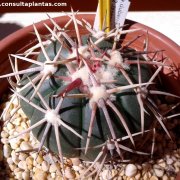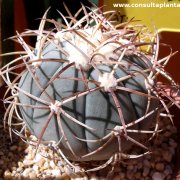Care of the cacti Echinocactus horizonthalonius or Turk's Head Cactus |
|
The genus Echinocactus, family Cactaceae, comprises 6 species of cactus native to Mexico and the Southwest of the USA. Some species are: Echinocactus horizonthalonius, Echinocactus grusonii, Echinocactus texensis, Echinocactus platyacanthus. Common names: Devil's-Head Cactus, Turk's Head, Eagle Claws, Bisnagre, Turk's-head Cactus, Devilshead, Silverbell Cactus, Turk's Head Cactus. This species is native to northern Mexico. They are cacti with a globose body that reach 25 cm (9.84") in height. They are bluish-green in color and covered in a thin waxy coating. They have 7 to 13 broad ribs with woolly areolas on the upper part of the plant. The radial spines are 5-7 (up to 2.5 cm/0.98" long) and the central spines can be 0-5; the spines are curved and can be gray or black. The showy apical flowers are up to 6 cm (2.36") in diameter and are pink and red. They bloom in summer, even several times. In the juvenile phase it's used in pots and planters; when it grows it's interesting for rockeries and gardens of cacti and succulents. Echinocactus horizonthalonius needs direct sun exposure and a hot, dry climate. It resists frosts of -2 ºC (28.4 ºF) if the substrate is well dry. Devil's-Head Cactus prefers a calcareous and sandy soil; use a mixture, in the same proportions, of vermiculite, coarse siliceous sand and clay garden substrate. Turk's Head needs less watering than most; water every 20 days in spring, every 10-12 days in summer, every 30-35 days in autumn and do not water in winter. Fertilize with mineral fertilizer for cacti in spring. Pruning is not necessary. Silverbell Cactus is a plant very sensitive to excess moisture that quickly rot the tissues. Although growth is very slow, propagation by seeds is quite simple. |
Images of the cacti Echinocactus horizonthalonius or Turk's Head Cactus |
Find plants
Echinocactus horizonthalonius or Turk's Head Cactus | Care and Growing
© 2026 FavThemes

